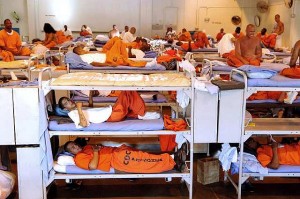Elite Privilege and For Profit Prisons
 The complex for profit prison web proves to be muddy and interlinked to major corporations–however, at the root of the problem is the fact that the criminal justice system in this country continues to be a a hallmark of class divide and privilege -Iliana
The complex for profit prison web proves to be muddy and interlinked to major corporations–however, at the root of the problem is the fact that the criminal justice system in this country continues to be a a hallmark of class divide and privilege -Iliana
Via Forbes
Quantum Tuba argues that, contra Warren Buffet, we should not focus on raising taxes on the rich, but rather on smashing elite privilege that favors the rich – an argument I’ve made a variety of in the past on several occasions, though I’ve never used the term ‘smash’. Tuba delves into the holdings of Buffet and digs up Wells Fargo and its involvement in the private prison industry:
The number two corporation in Warren Buffet’s stock portfolio is Wells Fargo. Wells Fargo is a major beneficiary of corporate welfare. For instance, they received $43.7 billion in federal taxpayer bailout money. But far more destructive is Wells Fargo’s investment in prison profiteers. Wells Fargo owns 4 million shares in the Geo Group, the second largest private prison corporation in America, and 50,000 shares in the Corrections Corporation of America (CCA), the largest private prison corporation in the country. These shares combined are valued at more than $120 million (Source: http://www.cjjc.org/en/news/50-immigrant-rights/215-wells-fargo-divest-from-prisons ).
Companies such as the Geo Group and CCA do not earn their money by providing goods or services to customers. Rather, they make their money solely from the government, and solely for locking human beings in cages, mostly for non-violent offenses. Further, these companies actively lobby for unjust laws, largely using the American Legislative Exchange Council (ALEC), a corporatist conservative political group.
He then cites this Nation piece on ALEC:
ALEC helped pioneer some of the toughest sentencing laws on the books today, like mandatory minimums for non-violent drug offenders, “three strikes” laws, and “truth in sentencing” laws. In 1995 alone, ALEC’s Truth in Sentencing Act was signed into law in twenty-five states. (Then State Rep. Scott Walker was an ALEC member when he sponsored Wisconsin’s truth-in-sentencing laws and, according to PR Watch, used its statistics to make the case for the law.) More recently, ALEC has proposed innovative “solutions” to the overcrowding it helped create, such as privatizing the parole process through “the proven success of the private bail bond industry,” as it recommended in 2007. (The American Bail Coalition is an executive member of ALEC’s Public Safety and Elections Task Force.) ALEC has also worked to pass state laws to create private for-profit prisons, a boon to two of its major corporate sponsors: Corrections Corporation of America and Geo Group (formerly Wackenhut Corrections), the largest private prison firms in the country. An In These Times investigation last summer revealed that ALEC arranged secret meetings between Arizona’s state legislators and CCA to draft what became SB 1070, Arizona’s notorious immigration law, to keep CCA prisons flush with immigrant detainees. ALEC has proven expertly capable of devising endless ways to help private corporations benefit from the country’s massive prison population.
Along with the defense industry, the criminal justice system in this country is one of the hallmarks of class divide and state privilege. Of course, it’s not just private prisons (though these are certainly a big problem) that profit from the mass incarceration of America’s poor. Prison guard unions are also big supporters of tough-on-crime policies, and opponents of policies that would lead to fewer criminals, fewer prisons, and fewer prison guard jobs.
ALEC may be behind some very pernicious legislation aimed at enriching private prison operators, but I can’t help but feel like when it comes to elite privilege, state favoritism, the war on drugs, and criminal justice writ large, we’re staring down a decidedly bi-partisan abyss. Tuba is basically making this point, and arguing that the typical progressive response – to tax the rich more – is insufficient. I tend to agree. Taxing the rich more won’t end the war on drugs or get nonviolent offenders out of prison. It may be a good idea on its own merits, but it won’t get down deep to the roots of our problems.












Be the first to comment
Sign in with